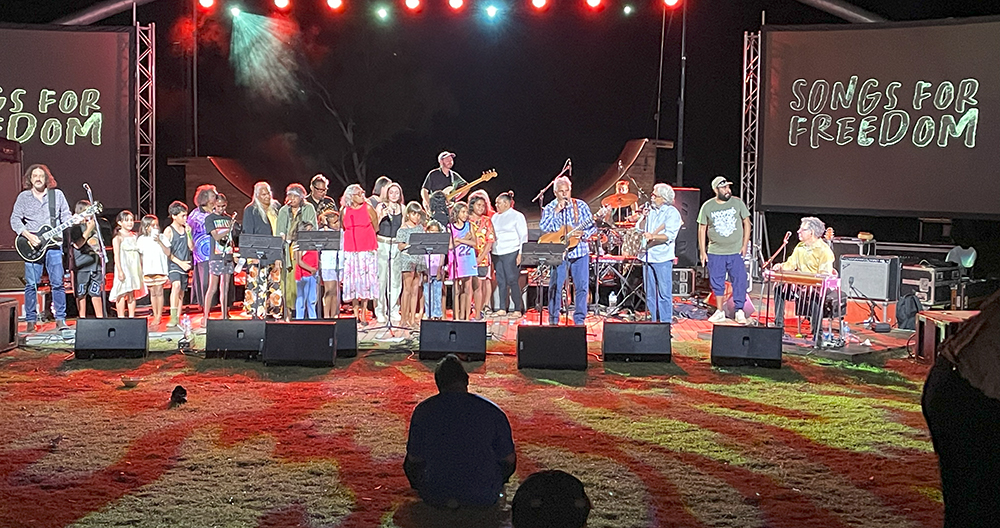Resourceful Acts: Producing Cultural Livelihoods on Resource Extraction Frontiers
Song of Freedom: Sing me a Song of Freedom, let those words take me home… I need a song to lift me up to stand me back on my feet. A song to make me feel, I know where I need to be. As I try to walk in these two worlds, trying to make sense of it all. The black, the white, the divided nation. The different rates of incarceration.*
Money: Money why did you come here? We had other things that made us rich. Who made you the law of the land, we’re done scratching your itch…Money you’re not leaving so let’s make a little deal. Teach me moderation, And I’ll teach you how to feel…you pit sister against brother, and let the poor be damned. **
These lyrical snippets from two songs were performed at the final concert of the Songs for Freedom performance in Roebourne (Pilbara, WA) on 21 September 2024. These songs, and many others, were written by Roebourne community members, inmates of the Roebourne regional prison and members of the Freedom Collective, during more than 10 years of intercultural engagement as part of Big hART’s New Roebourne Project.

We had the privilege of spending the week in Roebourne for rehearsals, to attend the prison performance and the final community concert at the invitation of Big hART (arts and social change organization) and the local Indigenous members of their board. The aim of the visit was to start building relationships with First Nations artists as we undertake our research project Resourceful Acts Cultural Livelihoods on Resource Extraction Frontiers. We want to understand their aspirations for cultural livelihoods and to co-develop arts-based research projects that create sustainable livelihoods in mining regions. Relationship building via creative research partnerships is not only standard practice for self-determination in research, but also demonstrates an ethics of care.
In the Pilbara mining region, Roebourne (Iremugadu) is one of the few towns that was not purpose-built for the mining industry. However, at the on-set of the iron-ore mining boom in the early 1960s it was on the front-line of the influx of the mining and construction workforce. At that time, local Aboriginal people lived on the reserve across the Harding River (their presence in the town was subject to a curfew) and though they had worked in the pastoral industry, they were excluded from the mining workforce. The death in custody of 16 year-old local Yindjibarndi boy John Pat in 1983 focused national and global attention on the racial divisions of the town and led to the Royal Commission into Aboriginal deaths in Custody. The 28th September was the 41st anniversary of Pat’s death.

The New Roebourne project incorporates the Songs for Freedom community performance and the associated Tjaabi performances led by Ngarluma community leader Patrick Churnside.
John Pat’s family have been instrumental in shaping the Songs for Freedom project which was developed in his memory and to raise awareness of the shockingly disproportionate number of Aboriginal people caught up in the legal system. During the prison concert at the Roebourne regional prison, what Sarah found most startling was the lack of non-Indigenous prisoners out of the almost 100 watching the performance.
Our Project: Resourceful Acts: Producing Cultural Livelihoods on Resource Extraction Frontiers
This cross disciplinary project - social anthropology and performance studies - aims to examine cultural practice (performance, film, digital art, song) as a creative and digital resource for creating sustainable cultural livelihoods. This approach recognises that Aboriginal Traditional Owners are more than just a local mining workforce or, if not employed in the industry, a regional marginalized group. Vast swathes of customary native title land has been radically altered through mining – yet these peoples need not be wholly defined by the mining industry as ‘extractive subjects’.
We are interested in exploring to what extent cultural production, drawing on cultural assets and community aspirations, can augment the ‘mainstream’ economy – in this case the mining industry – through the creation of cultural livelihoods and the community economy. How might theatre and performance practices resource the imagination and creation of post-extractive futures for First Nations peoples residing on resource extraction frontiers? This area is under-researched because mainstream economic activity tends to dominate alternate modes of productivity in mining regions, such as cultural production.
Our visit to Roebourne was enabled by a seed funding grant from the British Academy /Leverhulme Small Research Grants, and building from a QUEX workshop grant from 2023.

